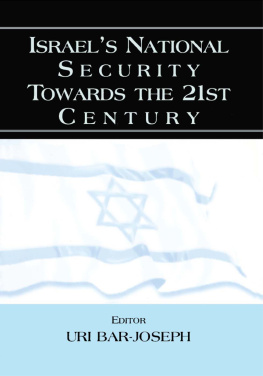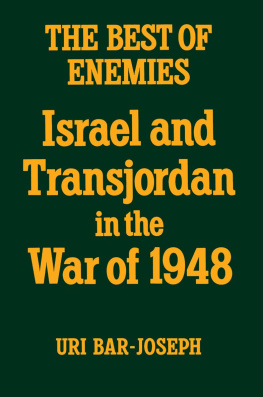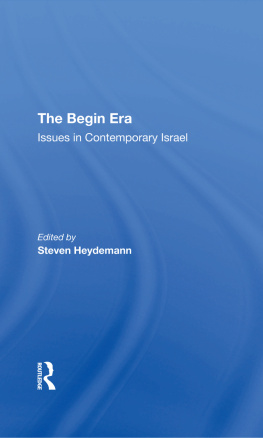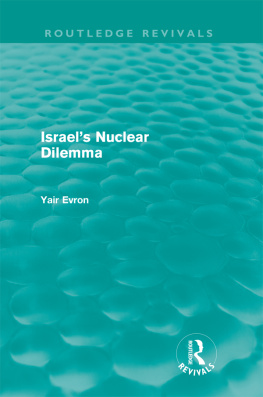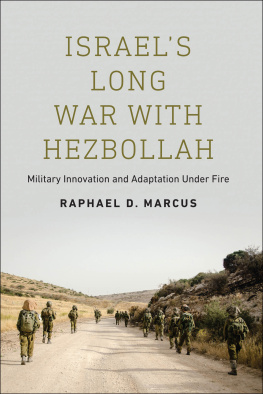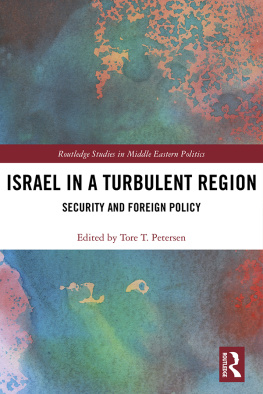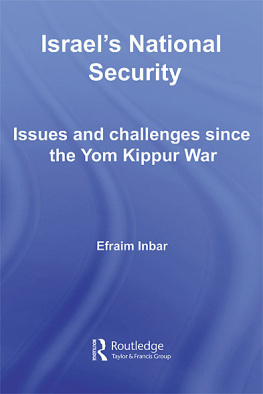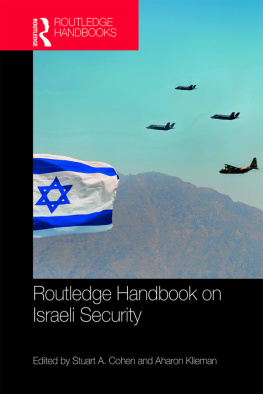ISRAELS NATIONAL SECURITY TOWARDS THE 21st CENTURY
Of Related Interest
Israeli Strategy after Desert Storm
by Aharon Levran
Democratic Societies and their Armed Forces: Israel in Comparative Context
edited by Stuart A. Cohen
Revisiting the Yom Kippur War
edited by P.R. Kumaraswamy
Fighting World War Three from the Middle East: Allied Contingency Plans, 19451954
by Michael J. Cohen
The British Army, Manpower and Society into the Twenty-First Century
edited by Hew Strachan
The US Military Profession into the Twenty-First Century
by Sam C. Sarkesian and Robert E. Connor Jr
Israels National Security Towards the 21st Century
Editor
URI BAR-JOSEPH
University of Haifa
First published by Frank Cass Publishers 2001
This edition published 2012 by Routledge
2 Park Square, Milton Park, Abingdon, Oxfordshire OX14 4RN
711 Third Avenue, New York, NY 10017
Routledge is an imprint of the Taylor & Francis Group, an informa business
Website: www.frankcass.com
Copyright 2001 Frank Cass Publishers
British Library Cataloguing in Publication Data
Israels national security towards the 21st century
1. National security Israel
I. Bar-Joseph, Uri
355.03305694
ISBN 0-7146-5169-9 (cloth)
ISBN 0-7146-8183-0 (paper)
Library of Congress Cataloging-in-Publication Data
Israels national security : towards the 21st Century / editor, Uri Bar-Joseph.
p. cm.
A special issue of the Journal of Strategic Studies on Israels national security conception at a crossroad.
Includes bibliographical references (p. ) and index.
ISBN 0-7146-5169-9 ISBN 0-7146-8183-0 (pbk.)
I. National securityIsrael. 2. IsraelDefenses. I. Bar-Joseph, Uri.
UA853.I8 I89 2001
355.03305694dc21
2001028963
This group of studies first appeared in a Special Issue on Israels National Security Towards the 21st Century of The Journal of Strategic Studies (ISSN 0140 2390) 24/2 (June 2001) published by Frank Cass.
All rights reserved. No part of this publication may be reproduced, stored in or introduced into a retrieval system, or transmitted, in any form, or by any means, electronic, mechanical, photocopying, recording, or otherwise, without the prior written permission of the publisher of this book.
In memory of Amos Perlmutter and Michael I. Handel, scholars and friends.
Contents
Uri Bar-Joseph
Benjamin Miller
Emily O. Goldman
Chris C. Demchak
Yiftah S. Shapir
Avi Kober
URI BAR-JOSEPH
Israeli military thinking since the 1950s argues one of its students is merely a footnote to the military thinking that was crystallized then.1 Though there is more than a grain of truth in this statement, tracing the intellectual roots of Israels present national security concept will bring us to an era even earlier than that. In part it is the 1930s the establishment of the first Jewish mobile units (Nodedet) by the unorthodox Haganah commander, Yitzhak Sadeh, and of the Special Night Squads (SNS) by the legendary British Captain Orde Charles Wingate in response to the Arab rebellion of 193639. Their most prominent students were Yigal Allon and Moshe Dayan. Both admit the impact of Sadeh and Wingate on their intellectual and military thinking and both influenced extensively Israeli approach to security problems. Allon, the 1948 Wars most important general, played a major role in shaping Israeli strategic thinking between the late 1940s and the 1973 Yom Kippur War. Dayan the Chief of Staff in the mid-1950s and Security Minister between 1967 to 1974 was the chief architect of the Israel Defense Forces (IDF) esprit de corps, and the most influential figure in security affairs in the aftermath of the Six Day War.2
Yet the founding father of Israels national security concept was no soldier but a civilian. Though he saw a military service in the First World War, David Ben-Gurion was never raised beyond the rank of corporal and had no combat experience. Moreover, until the British mandate of Palestine approached its end he had hardly occupied himself with security affairs. But since early 1947, when he realized, at the age of 60, that the birth of the Jewish state was likely to involve a war with its neighbor countries, his prime concern became Israels national security. It remained so until he left office in 1963.3
Ben-Gurions belief system was shaped in Tsarist Russia before the revolution, where struggle between Russian socialism and Zionism as a panacea to the Jewish problem was so common. As a grown man and already the leader of the Jewish Yishuv, he witnessed the Holocaust, which proved so vividly how real was the threat to the mere existence of the undefended Jewish people. And in 1948 he lead his country through a war in which its existence was put into question. Combined, these traumatic experiences facilitated a Weltanschauung in which Arab destruction of the new Jewish state was not only possible but also very real. No wonder, then, that Ben-Gurions approach to Israels security challenges can be best typified as security bolshevism. Since the early 1950s, when he concluded that Israel could not reach peace with the Arab world at a cost he deemed acceptable, he became the prominent carrier of the belief that all national resources should be mobilized for the sake of the states security. Consequently, not only immigration absorption, education, or buildup of settlements was security in his eyes, but also his famous ideal that Israel should become a light unto the nations (or lagoyim). As he explained it, besides its moralistic value, being a paragon to other nations has an important security function: without it Israel will lose the external support which is so essential to ensure her existence.4
Underlying Israels security conception that was born in the early 1950s were four elements which, to a large extent, remained dominant ever since:
The massive disproportion between Israeli and Arab national resources, chiefly in terms of territory, manpower, and GNP, prevents Israel from ending the conflict by military means, while allowing the Arabs to do so. Consequently, Israel is a territorial and political status-quo power. Hence, the only goal of the IDF, as implied by its name, is to defend the country against a revisionist Arab world.
The most fundamental and dangerous threat to Israeli existence is an all-out coordinated Arab surprise attack. Consequently, Israel should always maintain the ability to defend herself under the conditions of such a worst case scenario, known as mikreh hakol (the all-out case).
As derived from the above, Israeli national security doctrine rests on three pillars: deterrence (as implied by the defensive goals of its national security conception); strategic warning (on any development which might endanger its national existence); and decision (the military ability to win a decisive victory if deterrence fails).
The operational implications of this doctrine are chiefly two: (a) the buildup of the capability needed to provide a high quality strategic warning and a quick response to external threats. This explains why the Defense Military Intelligence (DMI), the Air Force (IAF), and the Navy are regular forces while the ground forces are based on reserve manpower. (b) Attainability to maintain operational initiative in the initiation of wars and in the battlefield, in order to be able to win a decisive victory within a short time.

